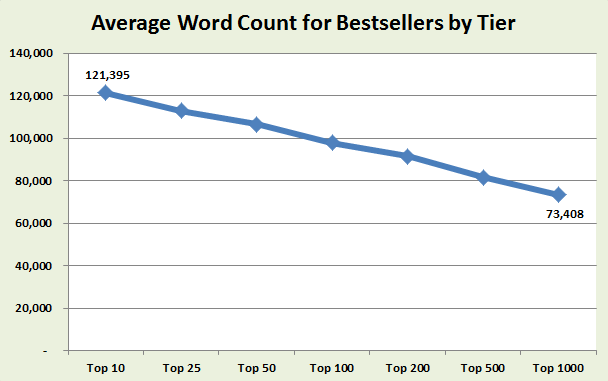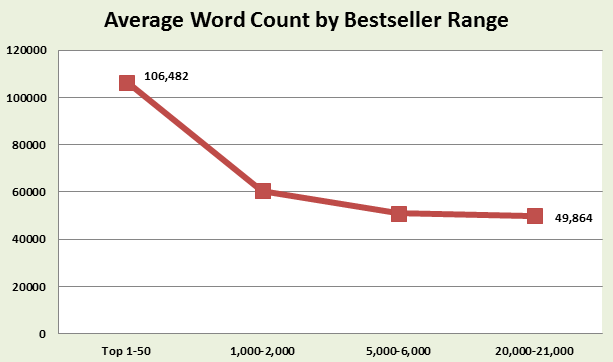Back in the early days of ebooks, it was common to hear experts prognosticate that ebook customers would prefer shorter books.
After all, the theory went, ebook readers are on the go, more subject to the ADHD distractions of the Internet, are reading in shorter bursts on mobile devices, and would be reluctant to spend too much time reading on screens. It seemed a plausible theory.
But is this really true?
Last month for a presentation at the RT Booklovers convention in Chicago I decided to crunch the numbers.
As an ebook distributor, my company Smashwords is drowning in a figurative sea of ebook sales data. We distribute over 100,000 ebooks of all lengths from self-published authors and small publishers to retailers such as the Apple iBookstore, Barnes & Noble, Sony, Kobo and Diesel.
I analyzed a nine-month chunk of sales data, aggregated across multiple Smashwords retailers, to determine if there were potential data-driven metrics that might reveal the answer to this and other common questions regarding reader preferences. The data encompassed millions of dollars in book sales for a data set of slightly more than 50,000 books.
The answer? The data indicates a strong preference among customers for longer e-books.
 The chart at left analyzes our 1,000 bestselling ebooks across all genres and categories, broken into ranges of top 10, top 25, top 50, etc.
The chart at left analyzes our 1,000 bestselling ebooks across all genres and categories, broken into ranges of top 10, top 25, top 50, etc.
It paints a remarkably straight line that indicates as the word count decreases, sales decrease. Our top 10 bestselling titles averaged 121,000 words. It's a length that most print publishers would discourage because of the cost of printing, shipping and handling.
It's worth noting that print publishers typically won't publish extremely short works either, simply because they need a minimum number of printed pages to create a solid spine upon which they can print.
With ebooks, however, there is no paper. An ebook publisher can create an ebook of 500 words (possibly a single poem) or an epic title of 500,000 words. Now that so many ebooks of all lengths are published, we finally have the data to start understanding what readers really prefer.

The next chart provides a more detailed perspective. In this chart above, I focus on specific bands of bestsellers, so the top 1-50, top 1,000-2,000, top 5,000-6,000, and top 20,000-21,000. By examining books within each band, we gain a better understanding of how readers are reacting within each range. The top 1-50 titles average 106,000 words, whereas the books ranked #20,000 through #21,000 -- a veritable no-man's land of poor sales and obscurity -- averaged under 50,000 words.
For additional perspective not shown in the chart, of the 119,000 ebooks published today at Smashwords, the average word count is 37,000 words. Considering that our average word count is 65% lower than the average word count for our top 50 bestsellers, it strengthens my believe that readers are going out of their way to search out and purchase longer ebooks.
If you enjoy geeking out on data, I've embedded my presentation deck below. Most of this data has never been released before by anyone.
In addition to ideal word length, I also sought to answer other questions related to reader preferences such as:
- If e-books never go out of print, how do sales develop over time?
- How do individual titles develop at a single retailer?
- Do romance readers prefer a different word count?
- What word count do erotica readers prefer?
- What impact does price have on unit sales?
- What are the most common price points for self-published ebooks?
- What price range earns the author the most money?
- What does the indie ebook sales distribution curve look like?
- What's the optimal price per word?
Reader preference for longer form ebooks speaks well for the future of books. Reading is an active, participatory activity between reader and book. The magic -- whether the reader's desire is to achieve pleasure or knowledge or both -- takes place inside the reader's mind. This holds true for both fiction and non-fiction.
In fiction, the power of long form is even more pronounced. Long-form fiction allow writers to create imaginary worlds the reader doesn't want to leave. This power to move mind and imagination isn't possible with shorter form media such as tweets and Facebook posts. Great fiction uses simple but elaborately crafted words on paper or screen to creates sights, sounds, smells and sensations more vivid than reality.
If you're a reader, ebooks open up the opportunity for you to discover new worlds previously unavailable by print-constrained publishing.
If you're a writer or publisher, go forth and create epic worlds for your readers. Your readers are waiting.
